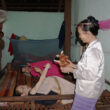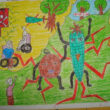Recently in Ha Noi I met with a group of undergraduates from a respected American university who were traveling throughout Viet Nam on a study tour with two faculty members. They were enjoying the sights and sounds, the mountains and beaches, the expanses of emerald rice fields, the teeming cities that make Viet Nam an increasingly attractive destination for tourists 50 years after the guns and bombs of a devastating war fell silent. The students were trying to make some sense of the history they had studied back home on their campuses, the story of a small Communist nation that clung tenaciously to its goal to be independent and free of outside domination, and which achieved that goal when the mightiest military in the world, the U.S. military, could not defeat them.
When I explained to the students the work that I and other American veterans of the war had undertaken to help Viet Nam recover from the war, to neutralize or erase some of the legacies of the war—such as cleaning up thousands of tons of bombs and mines, and countering the horrendous consequences of Agent Orange—the students would usually ask me, at some point, if I had joined this effort to help Viet Nam because of guilt for what America had done in Viet Nam.
It was a question I am asked frequently, and a reasonable one. There were sentiments of guilt, plenty to go around, among vast numbers of Americans who opposed the war, including veterans. I have heard many expressions of sorrow for what America did to this small country of Viet Nam, which had never caused us any harm and had never posed any threat to us. As an Army intelligence analyst, I had often felt sorrow and sometimes anger at the devastation we had caused and the pain and suffering we had visited upon so many innocent people. But I chose not to feel guilt about my role in the war because I concluded that the emotion of guilt was not particularly helpful or positive, it was more of a distraction, even a despairing excuse at times, for doing too little or doing nothing. Instead, I concentrated on responsibility—holding myself accountable for what I had done and committing myself to find ways to compensate for those damages, in some ways, however inadequate my efforts might be. I intended and hoped this might be an act of atonement. But instead of conveying guilt, with the personal burden that implies, I hoped to find ways to create something positive, an effort to make things right, actions focused on good—positives rather than negatives.
I’m not sure my answer satisfied all the students, though most of them nodded in apparent agreement. I continue, today, to ponder the “right” things we can do, as individuals and as a nation, to try to repair what we have damaged and correct grievous errors we have made over the past 50 years.
In my case, after the war ended, I encountered a fortunate option that offered tangible results for me, along with other Americans, Vietnamese associates, and international colleagues. That was Project RENEW, in central Viet Nam. Launched by the Vietnam Veterans Memorial Fund, or VVMF, in partnership with the government of Quang Tri Province in central Viet Nam, Project RENEW worked tirelessly with the Vietnamese military and international partners, such as Norwegian People’s Aid, Mines Advisory Group, and PeaceTrees Viet Nam. Over the past 20 years, RENEW staff and working partners have unearthed and destroyed more than 800,000 cluster bombs, grenades, rockets, artillery shells, and other ordnance. Meanwhile, the rate of accidents, injuries, and deaths in central Viet Nam has dropped to nearly zero. Residents there live in confidence that they understand the threat, they know how to protect their families and neighbors from harm, and they are part of the solution to this problem—which will be a danger for many years to come.
I continue to be part of the RENEW mission, responding to various needs at the edges where my American background and some of my skills may apply. Sometimes I’m asked to assist with grant proposals, budgets, public outreach, or to act as liaison with the U.S. Embassy and other international representatives to encourage cooperation and unity of effort.
Am I doing this out of guilt? There is unavoidably an element of shame in the fact that America’s military dropped more than five million tons of bombs on Viet Nam, contributing to an estimated three million casualties. Or that we sprayed 20 million gallons of Agent Orange and other toxic chemicals over southern Viet Nam. But for me, “guilt” is not a useful emotion; it is not the most helpful response we can offer to the massive amount of death and destruction that blanketed this country, which is still taking a toll in lives and limbs.
I believe a more constructive and positive response is for us to accept our responsibility for what we did here, to be accountable for the terrible loss of life and the destruction that occurred. Accepting the role that we should assume, our massive responsibility for genuine stewardship, is the first step toward remedying the situation, reducing and eventually ending the carnage.
An element in the recovery that RENEW seeks in rebuilding lives and limbs, in remediating war-ravaged landscapes, must be a recommitment to put peacemaking at the top of our agenda. If the United States can make sophisticated and enormously expensive airplanes, bombs, and rockets, surely we can agree on a reasonable formula that embraces actions leading to peace, not war. But the commitment must be first; the design of the plan can come later.
Our Vietnamese friends have shared with us a timely and uncomplicated policy that could work for every country, and which could bring peace if we embrace its tenets. The Vietnamese call it their “Four No’s”—and since 2019, it has been part of their foreign policy architecture:
- No military alliances—Vietnam does not enter into formal military alliances with any country.
- No foreign military bases on Vietnamese territory—Vietnam does not allow foreign countries to establish military bases within its borders. (If this principle were applied to the United States, it would read: No military bases on foreign territory.)
- No siding with one country against another—Vietnam maintains a balanced, independent foreign policy and does not take sides in international conflicts.
- No use or threat of force in international relations—Vietnam promotes peaceful resolutions and diplomacy over military action.
Vietnam’s “Four No’s” policy is the foundation of its defense and international relations strategy, emphasizing independence and neutrality. If other countries in the world adopted this simple policy of restraint, might we not achieve peace?
We do have a long way to go. We Americans must muster the courage, the strength, the creative energy to lead bold initiatives toward that world peace. We cannot go backward. Just when the Vietnamese are starting to trust the words and commitments of the U.S. government, we upend everything and stop humanitarian efforts funded by the U.S. government to expand the cleanup of bombs and mines, to provide much-needed support to the victims of disease, birth defects, and an array of horrible medical problems caused by the spraying of Agent Orange. Without warning, the U.S. pulls the plug and announces a freeze on all funding for such efforts, which have already achieved some success, even though the work is incomplete. Some of the funding has been temporarily restored, but for how long, and under what conditions?
It will take time to rebuild the trust that America has lost with these hasty and uninformed decisions.
A permanent restoration of funding already authorized by Congress would be an important first step. Then a longer-range commitment to continue the effort to successful completion would be a message welcomed by the Vietnamese and applauded by veterans and citizens all over the world.
And it would open the door to an honest discussion, a genuine acceptance of responsibility—instead of guilt—that might lead to a broader discussion of peace that some American veterans and ordinary citizens are eager to embrace.
As we ended our conversation, I admitted to the university students that we, the older generation, were leaving them with a terrible burden of responsibility to clean up the mess we were leaving behind for them. But they seemed clear-eyed, knowledgeable, ready to accept the challenge. Absent burdensome guilt but taking on responsibility for the mistakes and omissions of the older generation, perhaps the younger generation will lead the way to true peace, respectful of others, committed to justice, and convinced that they will continue until the mission is achieved.
Chuck Searcy is a co-founder of Project RENEW and a director of Friends of Project RENEW, Inc., an independent U.S. 501(c)(3) charitable organization that works closely with Project RENEW to advance its mission. A veteran of the Vietnam War, Chuck served in the 519th Military Intelligence Battalion in Saigon from June 1967 to June 1968. Chuck has represented three American veteran organizations in Viet Nam since 1995, including the Vietnam Veterans of America Foundation (VVAF), Vietnam Veterans Memorial Fund (VVMF), and Veterans for Peace (VFP). Chuck has lived in Ha Noi, Viet Nam, since 1994 and was awarded the National Friendship Medal of the State of Vietnam, the highest honor for foreigners who have served the country.




0 Comments